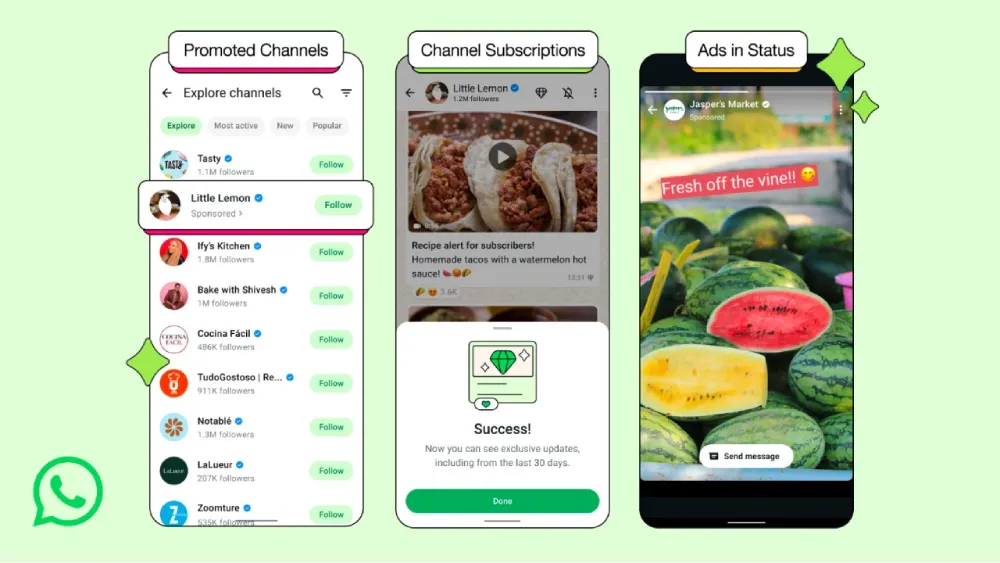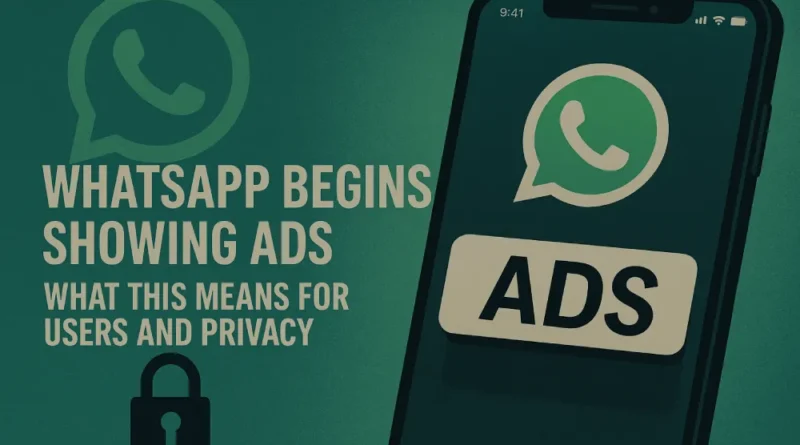WhatsApp Begins Showing Ads: What This Means for Users and Privacy
WhatsApp, the world’s most popular messaging platform with over 2 billion users globally, is undergoing a major transformation. Meta, its parent company, has officially begun rolling out ads within WhatsApp, marking a significant shift from its long-standing ad-free model. The changes include business advertisements in the Status section and Promoted Channels, using data like location, language preferences, and app activity to personalize user experience and boost Meta’s monetization efforts.
From Private Messaging to Ad Monetization
When Meta (then Facebook) acquired WhatsApp in 2014 for $19 billion, it promised to keep the app free of advertisements and centered around private, secure communication. Over the years, however, the pressure to generate revenue from its massive user base has steadily grown. While WhatsApp Business was introduced to help brands engage with customers, it remained separate from the consumer version. That separation is now slowly dissolving.
Meta is now testing ads within the “Status” section (WhatsApp’s version of Instagram Stories) and promoting content in Channels, a feature launched in 2023. These ads will be targeted, drawing on your language settings, in-app behavior, and approximate location to tailor content. Although WhatsApp’s core chat remains ad-free (for now), this rollout represents the clearest sign yet that Meta is bringing its advertising model to the WhatsApp ecosystem.
How the Ads Will Work
The ads are currently being tested with a select group of business users and are expected to be more widely rolled out in the coming months. According to Meta, these ads will appear:
- In the Status tab, similar to how ads are integrated into Instagram Stories.
- In Promoted Channels, where businesses or influencers can pay to boost their reach.
- Personalized using data like your device’s IP address (for rough location), selected language, and how you interact with different parts of the app.
Despite using this data, Meta claims that end-to-end encrypted messages will remain private, and the company will not read or use personal chats for ad targeting.
Why Now?
Meta is looking for new ways to make money besides Facebook and Instagram, which is why they chose to put ads on WhatsApp. Meta still makes most of its money from ads across all of its platforms. However, as its growth slows and competition from TikTok and other platforms grows, the tech giant has decided to use WhatsApp’s huge number of active users to its advantage.
The most recent financial reports from Meta show that over 200 million businesses are already using WhatsApp’s business platform. Message-based customer service has become an important way for companies to connect with customers. Meta wasn’t making the most of this traffic, though, because they didn’t have any straight ads. Businesses can get more attention and Meta can make more money from attention by putting ads in Status and Channels.

User Reactions & Privacy Concerns
Unsurprisingly, the move has sparked mixed reactions from users and privacy advocates. WhatsApp gained its popularity in part because it was minimalist, fast, and ad-free. The introduction of ads — even if not yet in chat windows — signals a departure from that promise.
Privacy experts are also voicing concerns over how Meta collects and uses data. While Meta says that it will only use non-sensitive information like language and app activity, critics argue that this could be a slippery slope. Given Meta’s history of privacy controversies, many users worry that further data extraction might follow.
There’s also the question of user trust. For years, WhatsApp has used its end-to-end encryption as a shield for user privacy. While encryption remains untouched, the use of metadata for ad personalization could erode confidence in the platform’s privacy-first reputation.
Meta’s Broader Monetization Strategy
Meta wants to turn WhatsApp into a business environment, not just a chat app, and this move is part of that plan. Aside from ads, WhatsApp is also working on shopping features, in-app payments, and communication tools for businesses that are built on APIs. It’s clear that Meta sees WhatsApp as the next big thing for business-to-customer chat, after Messenger and Instagram’s success in this area.
Meta is setting up a revenue-generating loop in WhatsApp by adding promoted channels and focused ads. Businesses pay to push content, users connect, and Meta makes money on both ends.
What This Means for the Future
The company Meta says that chat inboxes will not have ads “for now,” but adding ads to other parts of the app could lead to more paid features. The main question is whether users will agree with these changes or switch to other apps like Signal or Telegram that still don’t have ads and focus on privacy.
It’s clear that WhatsApp isn’t just a way to send messages anymore. As it grows, it will become a full-fledged business and marketing tool. Users should get ready for a more commercial approach going forward.
Disclaimer
The information presented in this blog is derived from publicly available sources for general use, including any cited references. While we strive to mention credible sources whenever possible, Web Techneeq – Web Development Agency in Mumbai does not guarantee the accuracy of the information provided in any way. This article is intended solely for general informational purposes. It should be understood that it does not constitute legal advice and does not aim to serve as such. If any individual(s) make decisions based on the information in this article without verifying the facts, we explicitly reject any liability that may arise as a result. We recommend that readers seek separate guidance regarding any specific information provided here.

